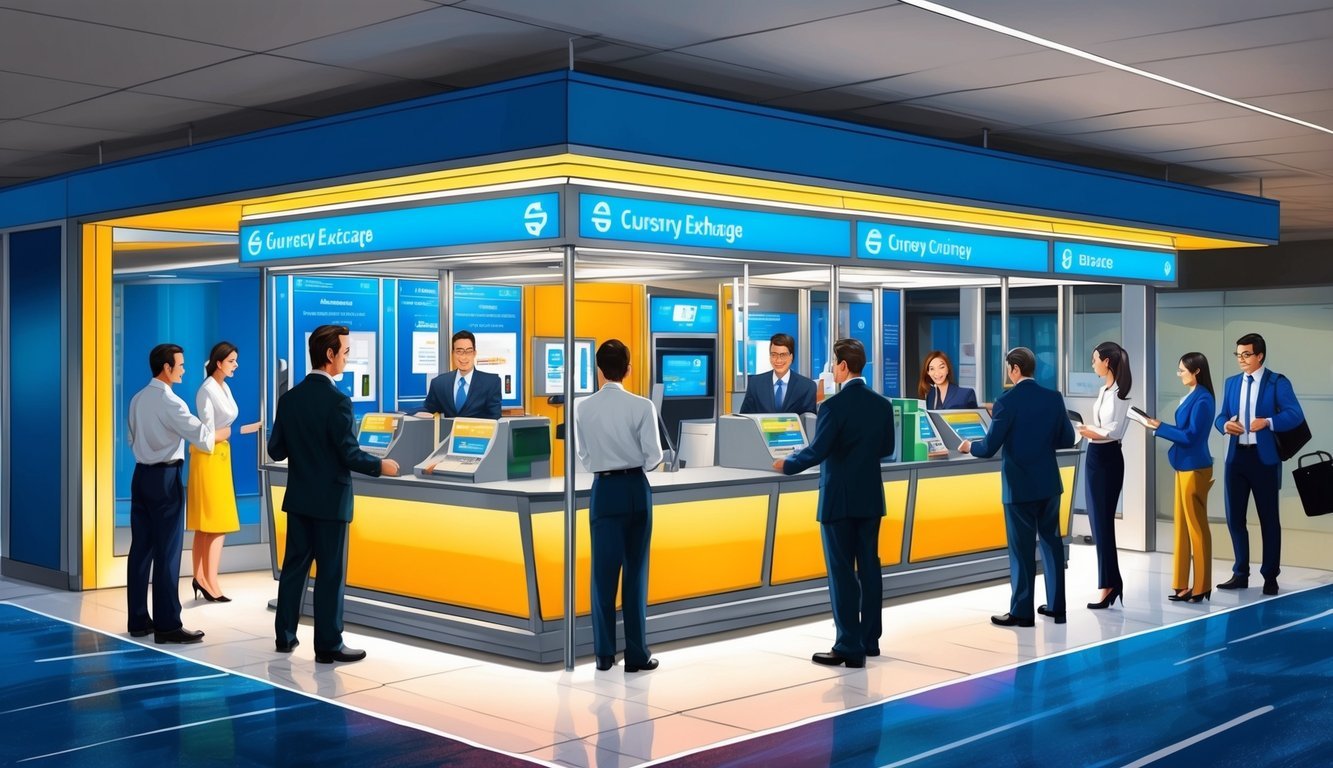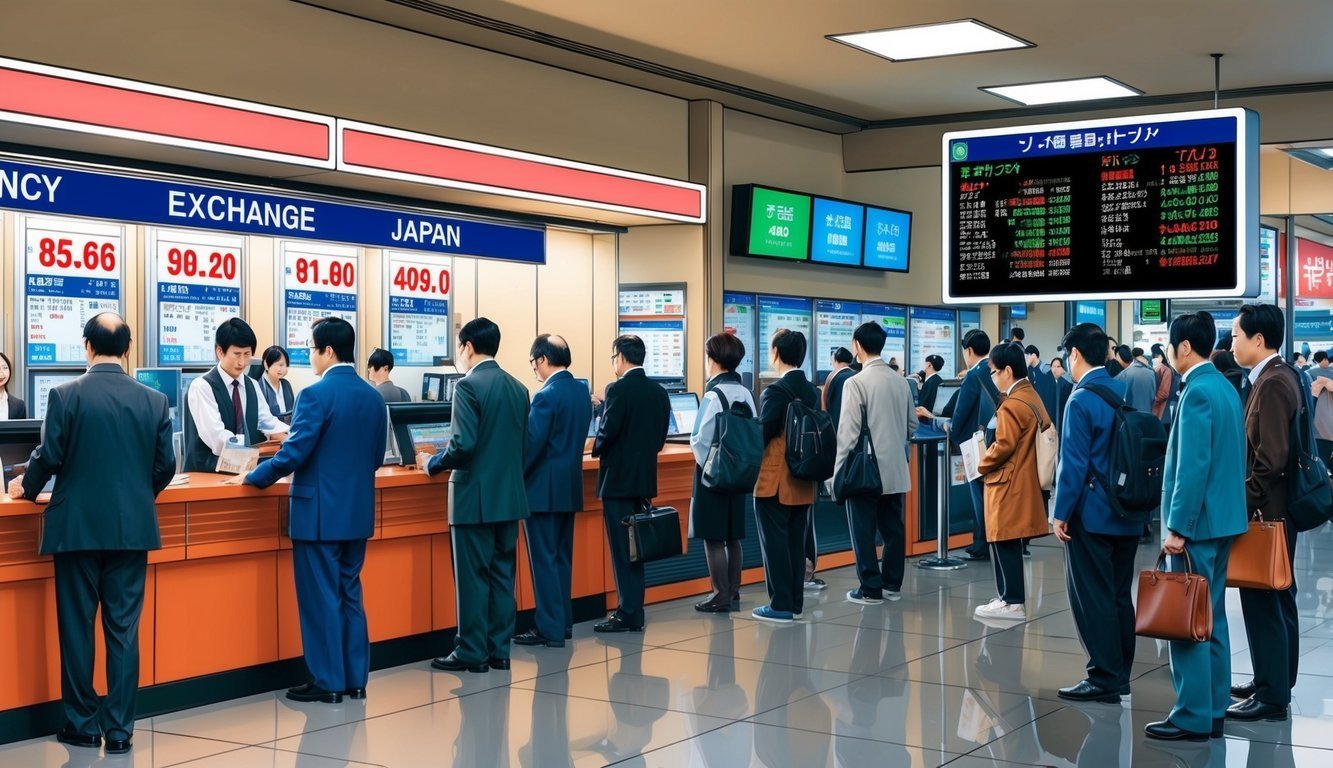When visiting Japan, you might feel a bit overwhelmed about how to exchange your currency. You want to get the best rates without any hassle while navigating through busy cities. Finding the best place to exchange currency in Japan can save you money and make your trip more enjoyable.
There are several options available, from airport exchanges to local money changers. Each has its pros and cons, so knowing where to go can make a big difference in your experience. With the right information, you can avoid unnecessary fees and get the most yen for your dollars.
Understanding Currency Exchange in Japan
When you arrive in Japan, you need to know how to exchange your currency. There are several options available, each with its pros and cons.
Overview of Exchange Options
In Japan, you have a few main choices for exchanging your money. Here’s a quick list of the most common options:
- Banks: Generally offer the best rates. You can find branches in major cities and airports.
- ATMs: Accept international cards, making them a convenient choice if you need cash. Look for machines with signs for international transactions.
- Currency Exchange Offices: Often found in tourist areas, but rates can vary.
It’s important to avoid exchanging currency at hotels, as they usually charge higher fees.
Current Exchange Rates
Exchange rates can change daily, so it’s smart to check beforehand. Banks usually provide competitive rates compared to smaller businesses.
For example, the difference could be significant:
- Bank Rate: 1 USD = 110 JPY
- Exchange Office Rate: 1 USD = 105 JPY
Tools like online currency converters can give you a quick lookup. Also, be aware of any fees that might apply to your transactions. Always ask about the rate being offered and how much you will get after any fees.
Tips for Exchanging Currency
When you travel to Japan, you want to keep your money safe and minimize fees. Knowing when and where to exchange currency can save you a lot of yen.
Avoiding High Fees
To avoid high fees, it’s best to exchange money at reputable banks or currency exchange counters. Airports often charge higher rates. While convenient, you might not get the best deal.
Be mindful of ATMs too. Many have withdrawal fees ranging from 0 yen to 220 yen. Before you insert your card, check your bank’s foreign transaction fees. Some banks have daily withdrawal limits, so plan your needs accordingly.
When using card payments, steer clear of Dynamic Currency Conversion (DCC). It allows merchants to charge you in your home currency, often at a poor exchange rate. Always choose to pay in yen to save more.
Choosing the Right Time to Exchange
Timing matters when exchanging currency. Rates fluctuate regularly, so keep an eye on market trends.
It’s a good idea to exchange money during weekdays when financial institutions are fully operational.
If you must change money at the airport, do it only for small amounts to cover immediate expenses. Waiting until you reach the city can be more beneficial. Major areas have more competitive rates and options.
Consider local holidays, as banks and exchange services may have limited hours. Planning your exchange ahead can help you avoid rush fees and maximize your yen.
Security and Safety Tips

When exchanging currency in Japan, you need to know how to identify safe places and protect your money. Follow these tips to ensure you have a smooth experience while handling your currency.
Recognizing Legitimate Exchange Outlets
To avoid scams, look for exchange outlets that are well-known and reputable. Here are some signs to identify safe places:
- Location Matters: Choose outlets at airports, hotels, or major banks. These are more reliable than small shops.
- License and Certification: Check if the outlet displays their license or certifications. Legitimate establishments often have this information visible.
- Avoid Street Vendors: Don’t exchange money with street vendors or in non-official locations. These transactions can lead to counterfeit currency.
- Read Reviews: Before choosing an exchange location, read recent reviews online. Other travelers’ experiences can give you insights into safety and service quality.
By sticking to verified locations, you can feel more confident when exchanging your money.
Protecting Your Currency
Keeping your cash safe while traveling is crucial. Here are practical ways to protect your Japanese yen:
- Use a Money Belt: Consider a money belt to keep your cash and cards hidden from view.
- Split Your Cash: Don’t store all your yen in one spot. Divide your money between different pockets or bags.
- Be Aware of Your Surroundings: Always be alert in crowded areas. Pickpockets often target places like busy train stations.
- Limit Withdrawals: When using ATMs, withdraw only what you need. This reduces the amount of cash you carry.
Frequently Asked Questions
You might have some questions about exchanging currency while in Japan. Here are answers to common queries that will help you navigate your money exchange needs better.
Where’s a solid spot to swap my dollars to yen in Tokyo?
For currency exchange in Tokyo, popular areas include major banks, airport exchange counters, and dedicated currency exchange shops. Places like Harajuku, Odaiba, and Shinjuku often have machines that are convenient and easy to use.
Is it usually cheaper to exchange money once I’m in Japan?
Exchanging money in Japan can sometimes be cheaper than doing it in your home country. Rates at local banks and ATMs can be favorable compared to what you might find abroad or at airports.
Got any tips on whether I should get yen before heading to Japan?
It’s wise to bring some yen with you before arriving in Japan. Having cash can help you cover immediate expenses like transport or meals, especially in rural areas where credit cards may not be accepted.
Know any good places in Japan for exchanging foreign currency?
Japan has many places for exchanging foreign currency, including major airports and banks. Currency exchange centers at Narita and Haneda airports offer accessible service right when you land.
What’s the scoop on Japan Post Bank’s currency exchange rates?
Japan Post Bank offers currency exchange services that are generally reliable. Their rates may vary, so it’s a good idea to check multiple places to get the best deal.
Can you just swing by anywhere in Tokyo to change your cash, or is there a go-to spot?
You can find many options for cash exchange throughout Tokyo. Banks and specific currency exchange shops are reliable, but always check for better rates at different places. These include exchange machines or dedicated counters.

